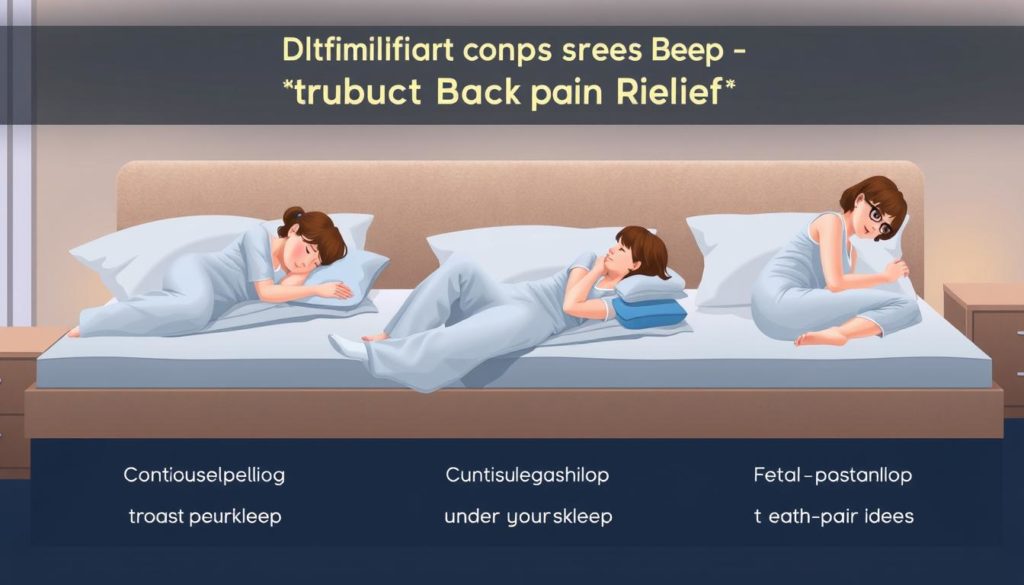Struggling with nighttime back pain can make sleep hard. It’s more than discomfort; it messes up your night, harming your health. Knowing the best solutions for this pain is crucial.
Good sleep is vital for health, but pain can block it. Using tips to ease back pain while sleeping helps a lot. Trying different sleeping positions and the right pillows helps. Regular exercises strengthen your core, promoting better sleep and less pain.
Creating a calming bedtime routine helps combat insomnia from back pain. If pain stays, seeing a doctor is key for the best treatment. Check out our nighttime back pain relief tips to find what helps you.
Understanding Nighttime Back Pain
Nighttime back pain can disrupt your sleep and your day-to-day life. It’s crucial to know why this pain happens and how it affects your sleep. This way, you can tackle it effectively.

Common Causes of Nighttime Back Pain
Several issues, like injuries, arthritis, or chronic conditions such as fibromyalgia, can cause back pain at night. This pain might be a dull ache or sharp stabs that keep you awake. Figuring out the cause is the first step to easing this pain.
Impact on Sleep Quality
Back pain at night does more than just ruin your sleep. It interrupts your body’s healing process, possibly making the pain worse. Knowing the link between sleep trouble and back pain is important. It helps you find relief and improve your daily life.
Let’s dive deeper into some common causes and how they affect sleep:
| Cause | Description | Impact on Sleep |
|---|---|---|
| Injuries | Physical trauma to back muscles or spine. | Interrupts sleep with sharp pain, stops deep rest. |
| Arthritis | Inflammation of joints in the spine. | Causes stiffness and dull aches at night. |
| Fibromyalgia | Widespread muscle pain and tenderness. | Leads to chronic discomfort, messing with sleep cycles. |
Understanding these causes and their sleep impacts helps you fight nighttime back pain. This improves your sleep quality and overall health.
Optimal Sleeping Positions for Back Pain Relief
Finding a comfy way to sleep with back pain is key for a good night. Here are some best sleep positions and tricks. These can improve your spine alignment and lessen back pain while you snooze.
Side Sleeping with Proper Support
Side sleeping works well with proper support. Put a pillow between your knees. It helps keep your hips, pelvis, and spine aligned. This eases back pain by reducing stress on your lower back during sleep.
Back Sleeping with Pillow Techniques
Back sleeping is good if you do it right. Place a pillow under your knees. It helps keep your spine’s natural curve and lowers strain on your lower back. This way, you stay comfy and ease back pain all night.

Choosing the Right Mattress for Nighttime Back Pain Relief
Choosing the right mattress is key for anyone dealing with nighttime back pain. It’s important to find one that offers both comfort and support. Looking at several factors is crucial when choosing the right mattress for back support.
When to Replace Your Mattress
It’s best to change your mattress every 6 to 8 years. As time goes by, mattresses lose the ability to support you well. This can make back pain worse. If your mattress sags or you feel stiff in the morning, it’s time for a new one.
Types of Mattresses for Back Support
There are different kinds of mattresses that can help your back:
- Memory Foam: These shape to your body for great pressure relief and support.
- Innerspring: Traditional spring mattresses offer good support and can be less expensive.
- Hybrid: Combines memory foam and innerspring for dual benefits.
The Role of Mattress Firmness
The firmness of a mattress is crucial for back support and pain relief. A mattress that is medium-firm is often best. It won’t cause discomfort like a very firm one, or lack support like a very soft one.
To reduce nighttime back pain, start with choosing a mattress that fits your body type and comfort preference.
Preparing Your Bedtime Routine
Starting a bedtime routine is key for back pain relief and good sleep. Begin with gentle stretches or soothing exercises each night. These can relax muscles and reduce tension, helping you sleep without pain.
Having a regular bedtime is also vital. Try to sleep and wake at the same hours daily, even on days off. This routine can help set your sleep cycle, making falling asleep and staying asleep easier.
Avoid stimulating activities before sleeping. This means no work or too much screen time before bed. Instead, do calming activities like reading or listening to calm music. This signals your body it’s time to sleep.
Make sure your bedroom is a sleep haven. Keep it dark, quiet, and cool for the best sleep quality. This setup can make a big difference for those with nighttime back pain. By crafting a routine, you can improve your sleep and wake up feeling renewed.
Effective Exercises to Reduce Back Pain at Night
Doing exercises regularly at night can help ease back pain and improve sleep. Focusing on strengthening your core helps support your spine better.
Core Strengthening Exercises
Core exercises are key for easing back pain. Moves like planks, bridges, and leg raises work on your abdomen and lower back. This supports your spine.
- Planks: Hold a plank for 30-60 seconds. Make sure your body is straight from head to heels.
- Bridges: Lie on your back with knees bent, lift your hips, then lower them after a few seconds.
- Leg Raises: Lie flat, raise and lower one leg at a time without bending the knee.
Doing these exercises often strengthens muscles for better back pain management.
Yoga and Stretching for Flexibility and Stress Relief
Yoga and stretching improve flexibility and lessen tension. Doing them at night also helps lower stress, leading to better sleep. Try adding these poses:
- Child’s Pose: A gentle stretch that lengthens your back muscles and eases tension.
- Cat-Cow Pose: This move boosts spinal flexibility and reduces discomfort.
- Seated Forward Bend: Focuses on the hamstrings and lower back for relief.
Sticking to a routine with these nighttime exercises can boost your health and sleep quality.
Managing Stress and Anxiety for Better Sleep
It’s crucial for those with nighttime back pain to tackle stress and anxiety. Using specific methods can ease stress. This leads to better sleep and less back pain.
Relaxation Techniques
Deep breathing and meditation are great for easing stress related to back pain at night. Trying guided imagery or progressive muscle relaxation can relax your mind. This helps lessen back pain discomfort. Such techniques not only fight stress but also prepare you for deeper sleep.
Benefits of a Consistent Sleep Schedule
Keeping a regular sleep routine is key for easing back pain. Matching your sleep pattern to your body’s clock makes falling asleep easier, reduces sleep disturbances, and may lessen back pain at night. Stick to a steady bedtime and waking hour to strengthen this habit. This programs your body to anticipate sleep at specific times, improving your ability to both fall asleep and stay asleep.
Alternative Therapies and Treatments for Back Pain
For those seeking alternative treatments for nighttime back pain, several options can help. Heat therapy is particularly effective. Using a heating pad or taking a warm bath before bed can relax the muscles. This reduces stiffness, bringing comfort.
Heat Therapy Before Bedtime
Heat therapy relieves back pain by boosting blood flow and relaxing muscles. You can use a heating pad on the painful area for 20-30 minutes before sleep. Another option is a warm bath, which helps you unwind in a soothing way.
Other Treatments to Consider
Besides heat therapy, other methods can also help. Massages ease muscle tension, and acupuncture focuses on pain points. It’s a good idea to see a pain management clinic for a tailored back pain plan. Trying these treatments can lead to better sleep.
The Role of Medications in Nighttime Back Pain Relief
When back pain disturbs your sleep, medicines can help ease the pain. You can choose from over-the-counter and prescription options. It’s key to know how they work and their benefits.
Over-the-Counter Pain Relievers
There are many options for easing nighttime back pain without a prescription. Medicines like acetaminophen, ibuprofen, and naproxen sodium are helpful for short-term relief. Some are even made specially to help you sleep better while managing pain.
Prescription Medications
If your back pain is constant or very bad, you might need prescription medicines. Doctors can prescribe muscle relaxants, antidepressants, or sedatives. These can help with both the pain and any muscle twitches or sleep issues, for a more peaceful sleep.
Tips for Adjusting Your Sleep Environment
Making your bedroom perfect for sleep is key to dealing with nighttime back pain. Change your bedroom into a quiet, cozy place. This can make your sleep better and improve your health. Here are some ideas to help:
Creating a Comfortable and Quiet Bedroom
To have a quiet, cozy bedroom, think about soundproofing or wear earplugs to keep out noise. Make sure your room is tidy. Choosing a good mattress and pillows will support your back and help you sleep better. For more advice on a peaceful sleep environment, check out Sleep Foundation.
Optimal Temperature and Lighting
It’s crucial to have the right temperature in your room for good sleep. Keep your bedroom cool, ideally between 60-67°F. This is the best range for sleep. Also, control the light by using blackout curtains or sleep masks. This makes your room dark and comfy for sleep. Cut down on blue light from screens before bed to sleep better and ease back pain.
These changes can turn your bedroom into a haven for sleep. They offer relief from back pain and boost your health. For more info on good sleep habits, look at this healthy sleep tips guide.
When to Seek Professional Medical Help
Encountering back pain now and then is normal. However, severe, ongoing pain or symptoms like numbness need expert attention. Ignoring pain that ruins your sleep or day-to-day life is a bad idea. It might point to a serious issue that needs checking and care.
A doctor can help you find relief for your back pain. They may suggest physical therapy, medicine, or other treatments. You’ll talk about more tests and ways to manage your pain better. This can greatly help you feel better. Reach out to a doctor if back pain stops you from doing normal activities.
Also, specialized pain clinics can offer advanced care. Getting medical help tackles your current pain and prevents it from coming back. Don’t wait to see a doctor if your back pain gets too much. Getting help quickly is key to feeling better and living healthily again.
FAQ
What are some common causes of nighttime back pain?
Nighttime back pain has many causes such as injuries and arthritis. Conditions like fibromyalgia also contribute to this issue. It leads to dull aches or sharp pains, making sleep hard.
How does back pain at night impact sleep quality?
Back pain at night makes getting good sleep tough. It’s hard to fall asleep and you might wake up often. This poor sleep can make the back pain worse, forming a bad cycle.
What are some comfortable sleeping positions for back pain relief?
For back pain relief, try sleeping on your side with a pillow between your knees. Or, sleep on your back with a pillow under your knees. These positions keep the spine aligned and ease pain.
Which types of mattresses are best for nighttime back pain relief?
Memory foam, innerspring, and hybrid mattresses are good for back support. Medium-firm is usually best. Remember to get a new mattress every 6 to 8 years for proper support and comfort.
How can a bedtime routine help alleviate nighttime back pain?
Having a regular bedtime routine helps with nighttime back pain. Include relaxing activities like gentle stretching. Avoid things that wake you up, like using your phone, to improve sleep quality.
What exercises are effective for reducing back pain at night?
Doing core exercises, yoga, and stretching can lessen back pain. These activities stabilize spine-supporting muscles and increase flexibility. They also help lower stress which is good for sleep.
What relaxation techniques can help manage stress and anxiety related to back pain?
Deep breathing, meditation, and guided imagery are good for reducing stress, which improves sleep. Keeping a regular sleep schedule helps your body’s internal clock stay on track.
What alternative treatments can be used for nighttime back pain relief?
Heat therapy with heating pads or warm baths before bed relaxes muscles. Exploring massages and acupuncture can also offer relief from stiffness and pain.
Are medications effective for managing nighttime back pain?
Over-the-counter pain relievers like acetaminophen and ibuprofen can help briefly. For longer relief, a doctor might suggest prescription muscle relaxants or sedatives.
How can I optimize my sleep environment to reduce back pain?
For less back pain, make your bedroom quiet and cozy. Use sleep masks and earplugs. Keep your room at a comfortable temperature to help you sleep better.
When should I seek professional medical help for nighttime back pain?
If your back pain is bad, doesn’t go away, or you feel numb or weak, see a doctor. They can check your symptoms and talk about treatments.


